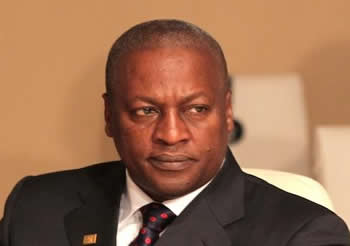President John Dramani Mahama on Tuesday indicated government’s readiness to use Chinese technology to detoxicate contaminated water bodies that serve as sources of drinking water for affected communities in the country.
He added that collaborations from other countries would also be advocated to reclaim degraded lands in the illegal mining communities.
President Mahama was conferring with Mr Gong Jianzhonh, the out-going Chinese Ambassador to Ghana at the Flagstaff House, Kanda in Accra.
Mr. Gong, who is retiring from diplomatic service after a three and a half year duty tour in Ghana, was among two other envoys who called on the President separately to bid him farewell.
The others are; Mr Peter Jones, out-going British High Commissioner to Ghana and Ms. Ruby Sandhou Rojon, out-going Resident Coordinator of the United Nations Development Programme.
President Mahama expressed the hope that Ghana-China collaboration in tackling illegal mining would turn an otherwise unfortunate situation into a positive one for the mutual benefits of the two nations.
He advocated for the need to attract major Chinese investment in large scale gold mining in Ghana.
President Mahama stated that China’s big market was an area Ghana could explore in its quest to add value to and process its products to gain more foreign exchange, as outlined in his state of the nation address.
The President indicated that the disbursement of the Chinese Development Bank loan was going on, especially with regard to the oil and gas component, and urged that any bottlenecks should be addressed speedily for the release of other components of the loan.
On trade between the two nations, he said government had planned to leverage the oil and gas industry to address the current trade imbalance between Ghana and China.
Trade between the two countries, according to the President, is about 5.4 billion dollars but the balance of about four billion dollars is in favour of China.
President Mahama noted that relations between the two countries, dating back more than five decades, had always remained cordial, recalling that the late President John Evans Atta Mills’ visit to that country resulted in the signing of the CDB loan agreement and took the bilateral relations to a different level.
Mr. Gong reiterated his country’s commitment to deepen its relations with Ghana, saying, both countries were on a transition path economically.
“As a retired diplomat, I will endeavour to promote Ghana and its culture in China,” he remarked, and expressed appreciation to the government for its support during his tenure as Ambassador to Ghana.
On Britain, President Mahama asked Ghana’s colonial master “to stand by Ghana in its difficult times,” to do the necessary adjustments to bring the economy back on track.
He noted that the British government, through its Department for International Development, (DFID) had supported Ghana immensely in health, education, management of payroll and other critical sectors of the economy.
President Mahama said the good relations between the two countries had resulted in some high level visitations, recalling the visit to Ghana by Mr William Hague, the British Foreign Minister, and his meeting with Mr David Cameron and some British private firms in London recently.
“Britain is currently one of Ghana’s biggest trading partners,” the President said and mentioned the role being played by Tullow to develop the country’s oil and gas resources.
Mr. Jones pledged his country’s continuous assistance to Ghana to address its challenges, saying, “We want to help you to address the challenges you face, we believe in Ghana and we want Ghana to succeed.”
He recounted collaboration with Ghana in the areas of defense, health, education, law enforcement; and added that half a million Ghanaians were making contributions to the health services, sports and politics in the UK.
The meeting between President Mahama and Ms. Sandhou-Rojon was held behind closed doors.
Source: GNA
























